Key Insights from Your FBI Fingerprint Background Check
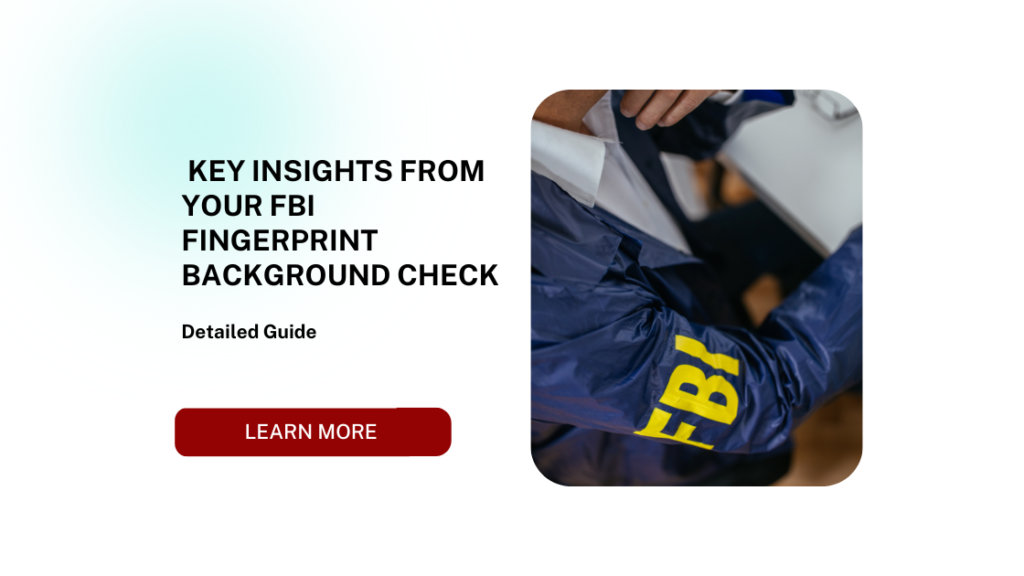
Understanding FBI Fingerprint Background Checks
An FBI fingerprint background check is a comprehensive screening process that analyzes an individual’s fingerprint records against the FBI’s vast criminal database. This method is widely regarded as one of the most accurate and reliable background screening tools. It is commonly used for employment, licensing, immigration, and volunteer opportunities, where ensuring a person’s criminal history is critical to making informed decisions.
Unlike traditional background checks that rely on name and Social Security number searches, FBI fingerprint checks leverage biometric data, making it nearly impossible to manipulate or falsify results.
Key Purposes of FBI Fingerprint Background Checks
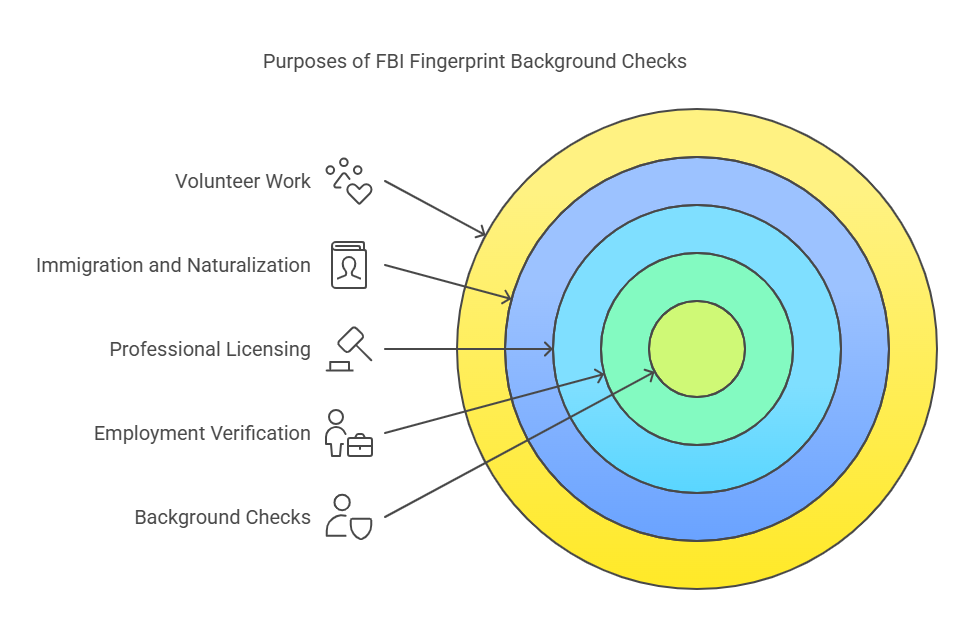
- Employment Verification
Many employers, especially those in industries like education, healthcare, law enforcement, and finance, require FBI fingerprint checks to ensure that candidates meet their ethical and legal standards. - Professional Licensing
State licensing boards often mandate fingerprint checks for professions such as attorneys, nurses, and contractors to ensure public safety and maintain trust. - Immigration and Naturalization
U.S. Citizenship and Immigration Services (USCIS) uses FBI fingerprint background checks to verify the criminal histories of applicants seeking visas, green cards, or citizenship. - Volunteer Work
Nonprofit organizations working with vulnerable populations, such as children or the elderly, often require FBI fingerprint background checks for volunteers to ensure a safe environment.
What Does an FBI Fingerprint Background Check Show?
FBI fingerprint background checks are designed to provide a detailed snapshot of an individual’s criminal history. Below is an outline of the information typically revealed:
| Type of Information | Details |
|---|---|
| Arrest Records | Includes arrests from local, state, and federal agencies, even if charges were dropped. |
| Convictions | Displays information about misdemeanor and felony convictions. |
| Warrants | Highlights any active warrants for an individual. |
| Pending Charges | Lists any criminal charges that are still in the judicial process. |
| Federal Criminal Records | Covers crimes investigated or prosecuted at the federal level, such as fraud or embezzlement. |
| Sex Offender Registry Data | Provides information if the individual is registered as a sex offender. |
Significance of the Information:
The data in these checks is vital for ensuring the safety, integrity, and compliance of various entities. For example, schools rely on these checks to identify individuals who may pose a risk to students, while licensing boards use them to uphold professional standards.
How the FBI Collects and Maintains Fingerprint Records
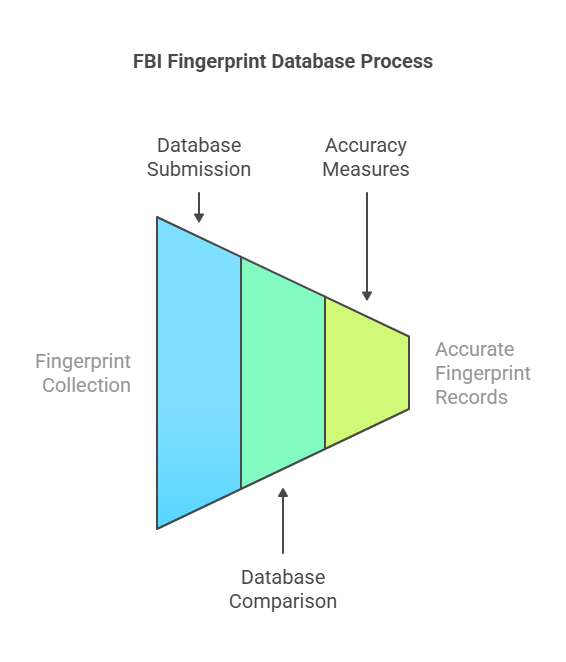
The FBI’s fingerprint database, known as the Integrated Automated Fingerprint Identification System (IAFIS) (now part of the Next Generation Identification or NGI system), is one of the largest in the world. Here’s how the process works:
- Fingerprint Collection:
Individuals’ fingerprints are collected through digital scanning or ink methods. These prints are submitted to the FBI for analysis. - Database Comparison:
The FBI compares the submitted fingerprints against its extensive repository, which includes data from:- Local, state, and federal law enforcement agencies.
- Immigration services.
- Military personnel records.
- Accuracy Measures:
Fingerprint checks rely on biometric matching, making them significantly more accurate than traditional name-based searches. However, errors can still occur if fingerprints are smudged or improperly scanned.
Advantages of FBI Fingerprint Background Checks
- Enhanced Accuracy: Biometric data minimizes false matches.
- Comprehensive Coverage: Access to national and federal criminal records ensures a thorough review.
- Reliability for Sensitive Roles: Ideal for roles requiring high security or working with vulnerable populations.
The Process and Benefits of FBI Fingerprint Background Checks
An FBI fingerprint background check is one of the most thorough ways to verify an individual’s criminal history. This process, grounded in biometric identification, provides unparalleled accuracy, ensuring that employers, licensing boards, and other organizations make informed decisions. In this section, we’ll explore the detailed process of obtaining an FBI fingerprint background check, the numerous advantages it offers, how it differs from other types of background checks, and tips to make the experience as smooth as possible.
Step-by-Step Process for Obtaining an FBI Fingerprint Background Check
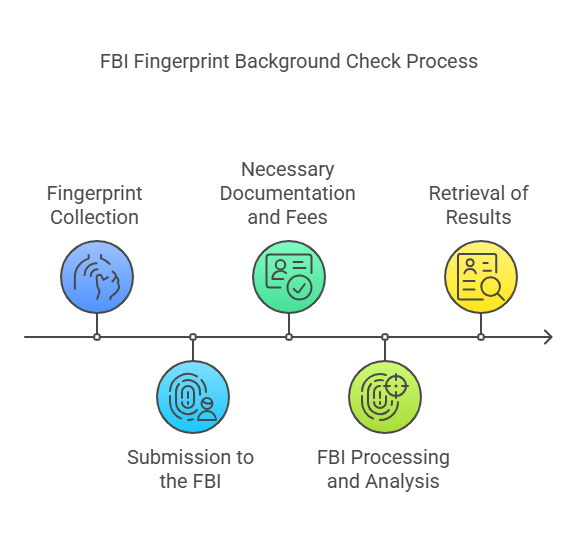
Understanding the process of obtaining an FBI fingerprint background check is essential for both individuals and employers. Here’s a comprehensive breakdown of each step involved:
Step 1: Fingerprint Collection
The first and most crucial step in the process is collecting the individual’s fingerprints. This can be done in one of two ways:
- Digital Scanning:
- Digital fingerprint scanners are the preferred method as they capture high-resolution images of fingerprints.
- The electronic nature of this method ensures minimal errors, making it faster and more reliable.
- Digital submissions often yield results within 24–72 hours, depending on the provider and the volume of requests.
- Ink-and-Roll Fingerprinting:
- In areas where digital scanning isn’t available, traditional ink-and-roll fingerprinting is used.
- This involves rolling each finger onto an ink pad and pressing it onto a fingerprint card.
- While effective, this method is more prone to smudges and errors, which may delay the processing time.
Tip: Clean and dry your hands before fingerprinting to prevent smudging or faint prints, which can result in processing delays.
Step 2: Submission to the FBI
Once fingerprints are collected, they must be submitted to the FBI for analysis. This can be done in several ways:
- Live Scan Services:
Authorized locations, such as law enforcement agencies, third-party vendors, or specialized providers, offer live scan services that electronically transmit fingerprints directly to the FBI. - Mail Submission:
Applicants who use the ink-and-roll method must mail their fingerprint card along with the required forms and fees to the FBI or an authorized channeler.
Note: While mail submissions are still accepted, they can take significantly longer to process, making live scan services the preferred option for most individuals.
Step 3: Necessary Documentation and Fees
Applicants must provide proper identification and pay the applicable fees for their background check. Required documentation typically includes:
- A government-issued photo ID (e.g., driver’s license, passport).
- Completed application forms, such as the FD-258 fingerprint card for mail submissions.
Fees:
- The cost of an FBI fingerprint check generally ranges between $50 and $100, depending on the service provider and the method of submission. Additional fees may apply for expedited services.
Step 4: FBI Processing and Analysis
Once submitted, the fingerprints are analyzed against the FBI’s Next Generation Identification (NGI) system. This database contains over 100 million criminal and civil records, ensuring a comprehensive search.
The processing time varies based on the submission method:
- Electronic submissions: Results are typically available within 24–72 hours.
- Mail submissions: Processing can take up to several weeks.
Step 5: Retrieval of Results
Results are provided either electronically or as a physical report, depending on the applicant’s preference. For employers, results are often shared directly with the requesting organization.
Pro Tip: Individuals should review their reports promptly to check for inaccuracies and address any discrepancies immediately.
Benefits of FBI Fingerprint Background Checks
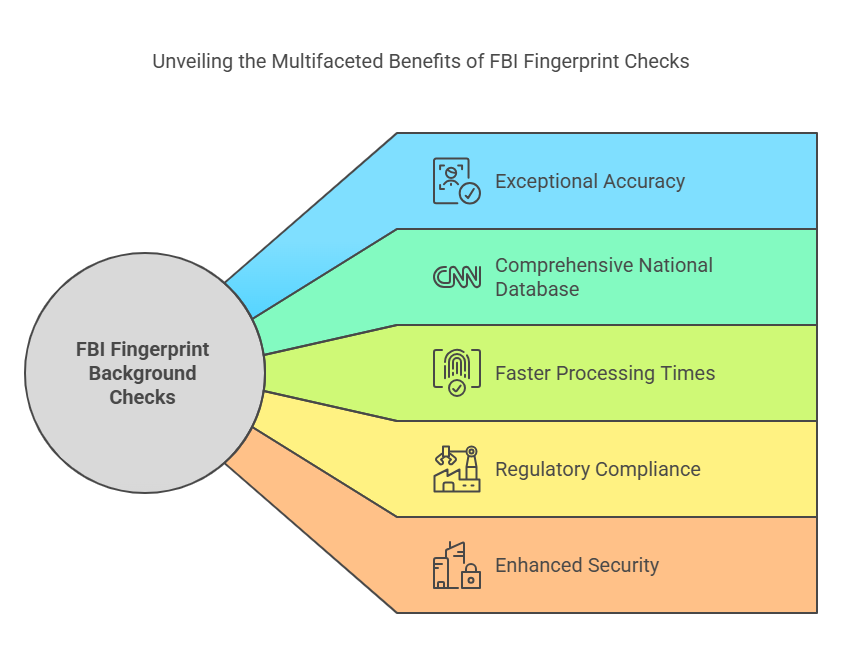
FBI fingerprint checks offer a host of advantages that make them indispensable for organizations and individuals requiring reliable background screenings.
1. Exceptional Accuracy
Fingerprint checks are based on biometric data unique to each individual, minimizing the risk of false positives or identity theft. Unlike name-based checks, which may produce errors due to common names or aliases, fingerprint checks tie directly to a person’s identity.
2. Comprehensive National Database
The FBI’s NGI system includes records from federal, state, and local law enforcement agencies, making it one of the most thorough databases available. This ensures that even out-of-state or federal offenses are included in the report.
3. Faster Processing Times
Advancements in digital fingerprinting technology have reduced processing times significantly. Electronic submissions can provide results in just a few days, enabling faster hiring and licensing decisions.
4. Regulatory Compliance
Many industries, including healthcare, education, and finance, are required by federal or state laws to conduct FBI fingerprint background checks. These checks help organizations comply with regulations while safeguarding their reputation and operations.
5. Enhanced Security
Fingerprint checks are ideal for positions involving access to sensitive information, vulnerable populations, or high-security environments. They ensure that only qualified, trustworthy individuals are allowed to take on such roles.
How FBI Fingerprint Background Checks Differ from Other Background Checks
| Feature | FBI Fingerprint Checks | Name-Based Background Checks |
|---|---|---|
| Identification Method | Biometrics (fingerprints) | Name, date of birth, and Social Security number |
| Accuracy | Extremely high; unique to each individual | Susceptible to errors and identity fraud |
| Database Coverage | National (federal, state, and local records) | Limited to state-level or public records |
| Processing Speed | Faster with digital submissions | Varies; can be slower depending on the provider |
| Use Cases | Employment, licensing, immigration, high-security roles | General employment or credit checks |
How Exact Background Checks Simplifies the Process
At Exact Background Checks, we are committed to simplifying the fingerprint screening process for both individuals and organizations. Here’s how we stand out:
- Nationwide Access: We provide access to authorized fingerprinting locations across the U.S., making the process convenient no matter where you are.
- Compliance Expertise: Our team ensures all screenings are conducted in full compliance with the Fair Credit Reporting Act (FCRA) and other applicable laws.
- Speed and Efficiency: We streamline the submission and retrieval process, delivering results quickly and accurately.
- Tailored Solutions: From small businesses to large enterprises, we offer customized screening packages to meet your specific needs.
Tips for a Smooth FBI Fingerprint Background Check Process
For Individuals:
- Prepare Documentation: Bring a valid photo ID and all necessary forms to your appointment.
- Choose the Right Location: Opt for an authorized live scan provider to ensure faster processing times.
- Review the Report: Check your results for accuracy and immediately report any errors to the FBI or your service provider.
For Employers:
- Partner with Trusted Providers: Work with reliable services like Exact Background Checks to ensure compliance and accuracy.
- Educate Candidates: Clearly communicate the fingerprinting process, including timelines and expectations, to applicants.
- Stay Informed on Laws: Regularly update your processes to align with federal and state regulations.
Legal Framework for FBI Fingerprint Background Checks
1. Fair Credit Reporting Act (FCRA)
The Fair Credit Reporting Act (FCRA) governs the use of background checks, including FBI fingerprint checks, ensuring they are used fairly and responsibly. Key provisions include:
- Consent Requirement: Employers must obtain written consent from individuals before conducting a background check.
- Notification of Adverse Action: If a background check influences a decision negatively (e.g., rejecting a job application), the employer must notify the applicant, provide a copy of the report, and explain their rights to dispute inaccuracies.
2. State-Specific Regulations
Different states may have additional laws regarding the use of fingerprint background checks. For example:
- Some states limit the types of information that can be considered (e.g., excluding arrests without convictions).
- Others have restrictions on how far back the records can go (e.g., seven years in California for certain roles).
3. Privacy Protections
The FBI is committed to safeguarding the privacy of individuals by securely storing and handling fingerprint data. Fingerprints are only used for authorized purposes and are not retained indefinitely unless required by law enforcement or other regulatory mandates.
4. Employer Obligations
Employers must:
- Ensure compliance with federal and state laws.
- Use background check information responsibly, avoiding discrimination.
- Regularly review their processes to maintain compliance with evolving regulations.
Common Risks and How to Mitigate Them
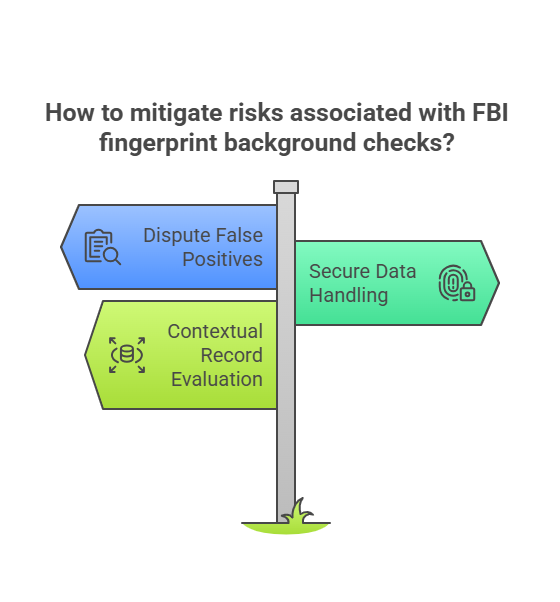
While FBI fingerprint background checks are highly reliable, certain risks exist:
- False Positives: In rare cases, outdated or incorrect records may appear in the database.
- Solution: Dispute the report with the FBI or the service provider.
- Identity Theft Concerns: Mishandled fingerprint data could be vulnerable to misuse.
- Solution: Use reputable and authorized service providers to handle your information securely.
- Over-Reliance on Criminal Records: Employers should consider the context of criminal history rather than making blanket decisions based solely on the presence of records.
- Solution: Evaluate the relevance of the records to the role being applied for and adhere to Equal Employment Opportunity Commission (EEOC) guidelines.
Frequently Asked Questions (FAQs)
Here are five common questions related to FBI fingerprint background checks:
How long does an FBI fingerprint background check take?
Digital submissions often take 24–72 hours, while mail-in applications may take several weeks. Processing times can also vary based on the volume of requests.
What information is included in an FBI fingerprint background check?
It typically includes arrest records, convictions, warrants, and other criminal history. In some cases, additional information such as expunged records or sealed cases may not appear, depending on legal protections.
Who can request an FBI fingerprint background check?
Employers, licensing agencies, immigration authorities, and individuals can request these checks. However, individuals must authorize the check when conducted for employment or licensing purposes.
How accurate are FBI fingerprint background checks compared to name-based checks?
Fingerprint checks are far more accurate, as they rely on unique biometric data rather than names, Social Security numbers, or dates of birth, which can be prone to errors or fraud.
Can individuals dispute inaccuracies in their FBI fingerprint background check?
Yes, individuals can dispute inaccuracies by contacting the FBI or the service provider. They will need to provide supporting documentation to correct the record.
Conclusion
FBI fingerprint background checks are an essential tool for verifying criminal history with unparalleled accuracy and reliability. Whether used for employment, licensing, or other purposes, these checks help ensure safety, compliance, and informed decision-making.
Key takeaways from this article include:
- The FBI fingerprint background check process involves fingerprint collection, submission, analysis, and result retrieval.
- These checks offer superior accuracy, comprehensive national coverage, and faster processing times compared to traditional name-based checks.
- Legal compliance with FCRA, state-specific regulations, and privacy protections is crucial for both employers and individuals.
At Exact Background Checks, we are dedicated to simplifying the process of obtaining reliable FBI fingerprint background checks. Our expertise in compliance and our commitment to providing fast, accurate results make us the trusted choice for employers and individuals alike.



